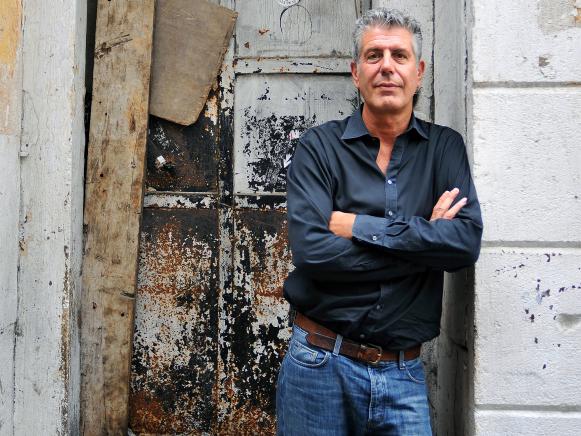Yesterday I awoke to the news that Anthony Bourdain had died at the age of 61—he had apparently committed suicide. This was inexplicable. How could a man so wonderfully alive possibly be dead?
I was a latecomer to Bourdain’s world; it helped that he was a film buff. A few years ago, I bumped into him on TCM as a guest programmer, talking about his love of The Searchers. He was enthusiastic and astonishingly well informed. The Searchers had been sitting on my ‘must see’ list—more as a duty than as a pleasure—but it was Bourdain who finally persuaded me to watch it. He popped up on the station again later as the host of a series about food on film. There was Babette’s Feast and Tom Jones and more surprisingly, Cool Hand Luke. His introduction to My Dinner with André was simple: this film will dazzle you or leave you cold. Either way you’ll never see anything quite like it. And he was right.
But it took Patrick Radden Keefe’s profile of him in The New Yorker last year to make me a fan. Bourdain was a fascinating subject, one Keefe had wanted to interview for a while, and reading his piece you sense how much he enjoyed being in the chef’s company. He zips around Hanoi with him, watches him spar in a jujitsu session and generally asks what makes him tick. As opinionated and quick as you would expect, Bourdain is also fearless and remarkably candid. Speaking with Keefe he seems to feel that his job, his life is highly improbable. Yet reading about him it all seems right. He takes such pleasure in the world and has a philosophy of travel which, to me, matches the Doctor’s in Doctor Who: when in Rome, meet everyone and try everything. What else could he have been but a globe-trotting, punk-rock chef-cum-author and presenter? Hungry for more, I dug through The New Yorker’s archives and found the exposé of kitchen life which launched his literary career.
Then I rushed out and bought a copy of Kitchen Confidential. Reading it was like chatting after closing time with the playful, disreputable chef friend I never knew I wanted. Bourdain’s voice was unique: an irresistible combination of swagger and honest zeal. Here he is as a kitchen neophyte in Provincetown, Massachusetts, dropping a hot pan and drawing the wrath of Tyrone, a seasoned broiler man:
“he raised his own enormous palms to me, brought them up real close so I could see them properly: the hideous constellations of water-filled blisters, angry red welts from grill marks, the old scars, the raw flesh where steam or hot fat had made the skin simply roll off. They looked like the claws of some monstrous science-fiction crustacean, knobby and calloused under wounds old and new. I watched, transfixed, as Tyrone—his eyes never leaving mine—reached slowly under the broiler and, with one naked hand, picked up a glowing-hot sizzle-platter, moved it over to the cutting board and set it down in front of me.
He never flinched.”
Bourdain dispensed culinary wisdom and dished on the restaurant business even as he celebrated it. The book was so delicious I looked forward to commuting on the subway (and having the chance to read).
I only ever saw Bourdain in person once, at The New Yorker Festival. He was thoughtful, curious, funny, inspiring—everything I’d hoped he’d be. The hall was packed and the crowd he drew, from every continent except Antarctica, was a testament to his wide reach.
And now he’s gone. I’ve been watching episodes of his CNN series Parts Unknown, each one a time capsule. There he is on a beach in New Jersey, recreating the closing shot of The 400 Blows. In Glasgow, singing the praises of deep-fried haggis, “sinister sheep parts, in tube form”. In Hanoi, joking with Barack Obama about the suitability of ketchup on hot dogs. Auntie Mame said life is a banquet. Anthony Bourdain knew it and he spent much of his life trying to share that knowledge with the rest of us. I just wish he had stayed longer.

Leave a Reply